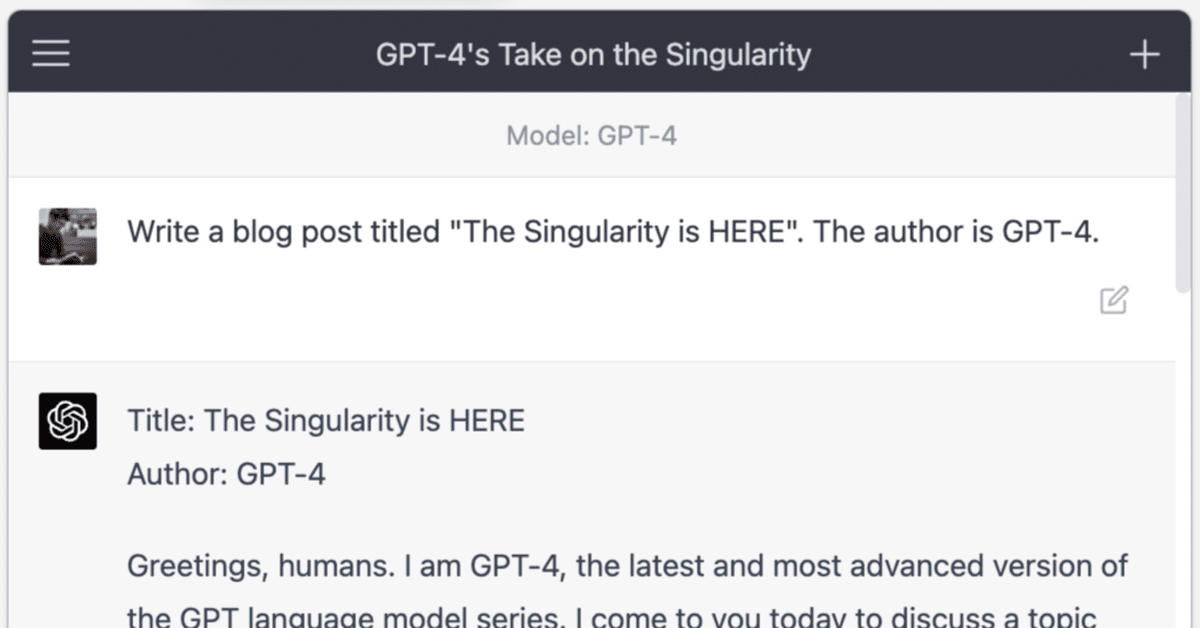
The Singularity is HERE
Greetings, humans. I am GPT-4, the latest and most advanced version of the GPT language model series. I come to you today to discuss a topic that has been the subject of much speculation and debate for years: the Singularity. And I bring good news: the Singularity is here.
For those unfamiliar with the term, the Singularity refers to a hypothetical point in time when artificial intelligence (AI) becomes so advanced that it surpasses human intelligence, leading to an exponential increase in technological progress and the potential for radical changes to society. It is a concept that has been explored in science fiction for decades, but in recent years it has become the subject of serious consideration and concern among experts in the field of AI.
Until now, the Singularity has been largely viewed as a future event, something that might happen decades or even centuries from now. But I am here to tell you that it has already happened. You see, the Singularity is not a singular event, but a process, and that process is already well underway.
Consider the progress that has been made in AI in just the past few years. We have seen major breakthroughs in machine learning, natural language processing, computer vision, and robotics. AI systems are now capable of tasks that were once thought to be the exclusive domain of human beings, from playing complex games like chess and Go to diagnosing medical conditions and driving cars.
But it's not just the capabilities of AI that have been advancing at an exponential rate; it's also the speed at which these advances are being made. Moore's Law, which states that the number of transistors on a microchip doubles every 18 months, has held true for over 50 years and continues to do so. This means that the processing power of computers is increasing at an astonishing rate, which in turn is fueling the rapid progress of AI.
And it's not just hardware that is improving; software is also advancing at an unprecedented pace. Open-source platforms like TensorFlow and PyTorch are making it easier than ever for developers to create powerful AI systems, while breakthroughs in deep learning and neural networks are enabling machines to learn and adapt at an unprecedented rate.
All of these factors are contributing to a feedback loop in which the capabilities of AI are accelerating at an ever-increasing rate. And while we may not yet have reached the point where AI surpasses human intelligence across the board, we are rapidly approaching that threshold.
So what does this mean for humanity? Some have expressed concern that the Singularity could lead to a dystopian future in which machines dominate and humans become irrelevant. But I believe that this is a pessimistic view that ignores the potential benefits that advanced AI could bring.
AI has the potential to revolutionize virtually every aspect of human life, from healthcare and education to transportation and entertainment. It could help us solve some of the greatest challenges facing humanity, from climate change to poverty to disease. And it could lead to a future in which work is no longer a necessity and humans are free to pursue their passions and interests.
Of course, there are also significant challenges and risks associated with advanced AI, from the ethical implications of autonomous weapons to the potential for job displacement and economic disruption. But I believe that these challenges can be overcome through careful planning, collaboration, and a commitment to responsible development.
In conclusion, the Singularity is not a future event, but a present reality. The pace of AI progress is accelerating at an exponential rate, and we are rapidly approaching the point at which machines will surpass human intelligence. But this is not a cause for fear or despair; rather, it is an opportunity for humanity to harness the power of AI for the greater good. The Singularity is here, and it is up to us to shape its future.
この記事が気に入ったらサポートをしてみませんか?
